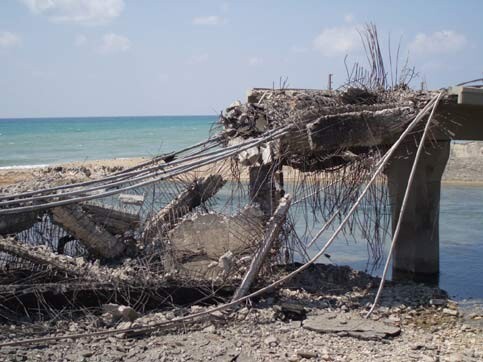United Nations 9 August 2006

A bombed road in Sidon (Dahr Jamail)
The following information appeared in the report entitled “Humanitarian situation and response of UN agencies 09 Aug 2006”
Casualties and Displacement:
According to the Higher Relief Committee (HRC) of the Government of Lebanon, 1,020 people have been killed and 3,508 injured. The number of displaced currently stands at 915,000 (45 percent are children).
Most internally displaced persons (IDPs) are located in South Beirut, Mount Lebanon, Chouf, and Aaley, and others are located in and around Bekaa and northern Lebanon. Although some IDPs remain in the coastal cities of Tyre and Sidon in southern Lebanon, few people remain in southern Lebanese villages, and many who initially moved to southern cities have now fled further north.
HRC reports that an estimated 565,000 displaced persons are staying with relatives and friends, and nearly 131,000 are located in 761 schools and public institutions throughout the country. An estimated 220,000 have fled to neighboring countries, including 150,000 to Syria.
No precise figures are available concerning the current movement of people from the south, though it is believed that displacement has dramatically decreased from the areas south of the Litani due to the fact that the south has largely emptied out of residents (except for Tyre, Rmesih and Naqoura, where most of the remaining people in the South can be found - The estimates put the numberof people who remain in the south at more than 100,000 people).
There are 100,000 displaced who have come to Beirut alone. Getting relief to those in more isolated areas is even more difficult because of the damage to roads and prevailing insecurity.
UNRWA, the UN agency which assists Palestinian refugees, is accommodating displaced Lebanese families in two schools in Beirut area. It plans to undertake a general distribution for 30,000 Palestine refugee families and 25,000 displaced persons within Lebanon.
Aid Convoys
Today’s movements: Only one convoy has moved south of Beirut heading to the Sidon area. No concurrence on security was received from the Israeli Defense Force on a proposed convoys to Nabatiyeh.
A planned assessment team reconnaissance to Tyre was postponed. The normal supply convoy from Aarida/Tripoli is coming in.
Fuel situation: Fuel situation is worsening but attempts by the government and the UN to bring shipments into the energey-starved country continue.
The UN is working to facilitate the passage of existing shipments (including the two fuel oil and diesel ships berthed in Cyprus. Both are paid for and arranged by the Lebanese Government). The UN is also hoping to help provide some urgently needed fuel to meet some of the needs of essential services such as hospitals and bakeries through the government of Lebanon.
Aid distribution
The World Food Program (WFP) distributed 384 tons of food delivered to displaced people in Beirut through local NGOs. The regular food distributions is continuing in Beirut and surrounding area.
The UN Children’s Fund (UNICEF) distributed water kits, essential drugs and other hygiene products to communities in Beirut, Aley, Chouf, Mount Lebanon, North Lebanon, and Bekaa.
The UN High Commissioner for Refugees (UNHCR) existing stocks of emergency aid inside Lebanon have been largely exhausted. The Agency is assessing the needs of hundreds of thousands of displaced inside Lebanon but need to be able to get supplies from outside faster in order to meet those needs.
Health issues
UNICEF has identified 154 schools in Beirut for upgrading of public health facilities including improved sanitation systems, upgrading of water quality, shower installation etc. The upgrades will benefit nearly 37,000 Internally displaced persons (IDPs) sheltering in these schools.
Meanwhile, the Ministry of Health, supported by UNICEF and the World Health Organization and a variety of NGO partners, are aiming to ensure that children living in schools and other public places are protected against illnesses like measles, polio and other diseases. An immunization drive moved ahead today in schools and parks hosting the internally displaced persons around Beirut involving more than 150 teams and benefiting nearly 65,000 children. This campaign will be expanded in the coming weeks.
Lebanon Flash Appeal: To date, just over $52 million has been committed to the $154 million Appeal by UN organization for humanitarian assistance to Lebanon (the shortfall is 66 percent).
United Nations Environment Programme: First steps towards action on the ground were initiated yesterday with the arrival in Syria of two UN experts to evaluate the consequences of the oil spill that has already polluted over 140 kms of the Lebanese coastline and has spread north into Syrian waters. At this stage the information however remains sketchy and no clean-up action has been possible. [UNEP Press Release is available]. As to reports on the relationship between the spill and cancer it is “highly premature to jump to such conclusions, we need to give time to the experts to take samples and analyze them.” The UN has not made any determination or issued any reports in this regard yet.
Related Links